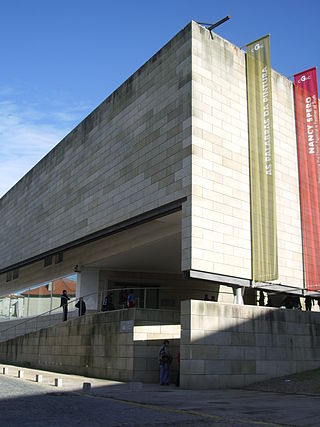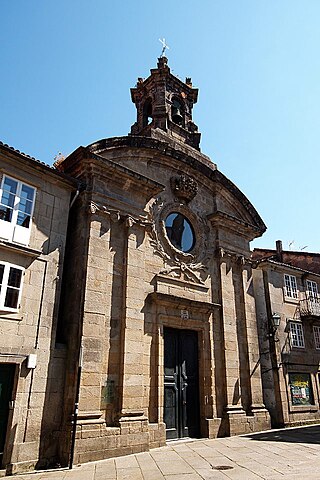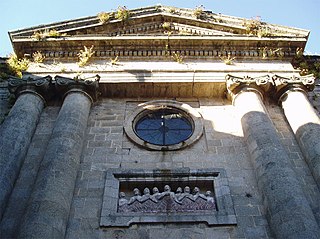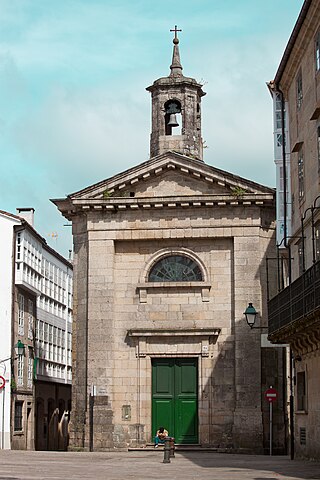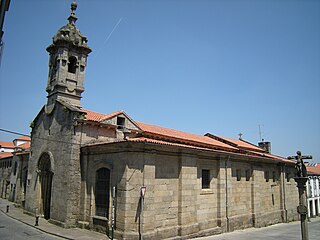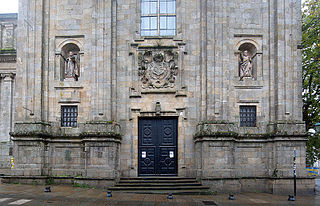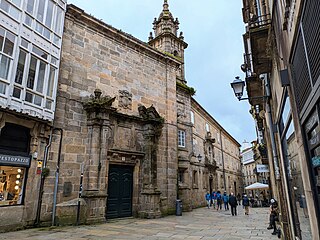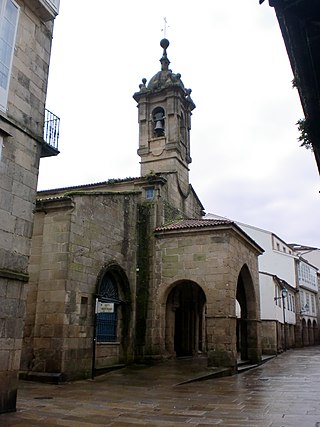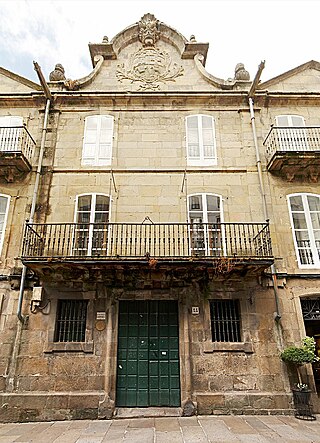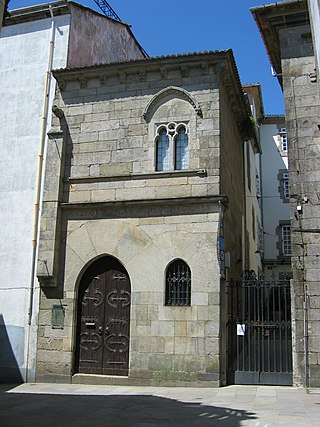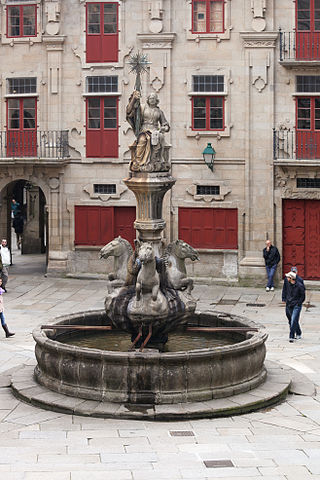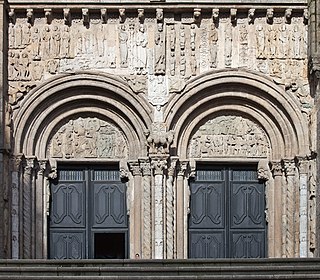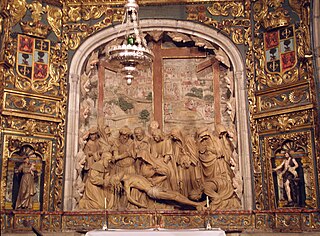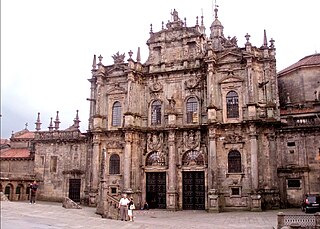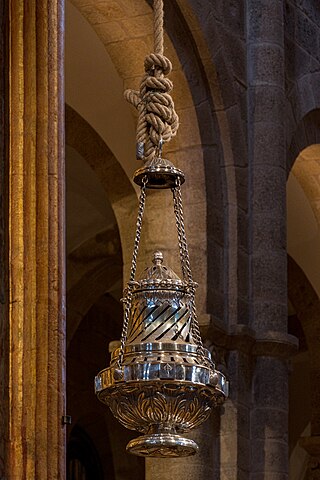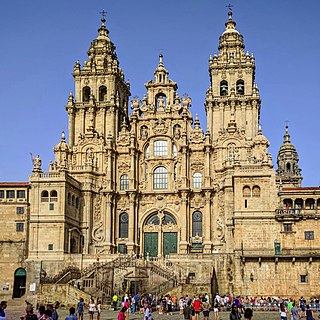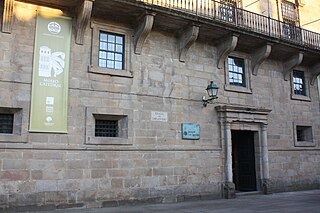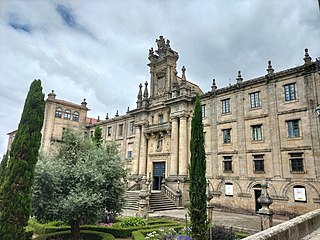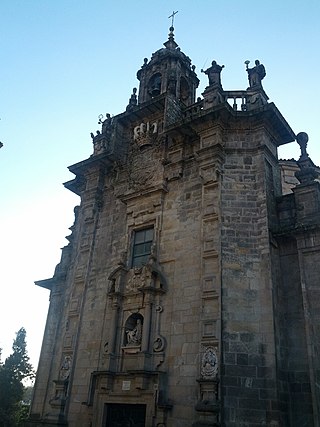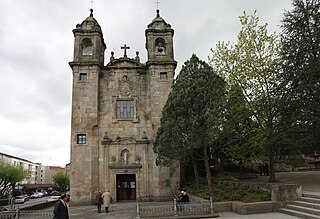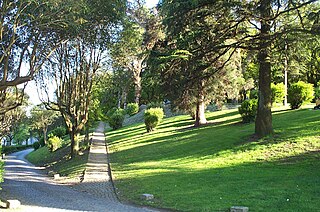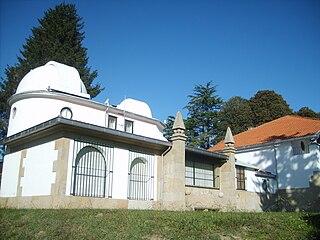Self-guided Sightseeing Tour #2 in Santiago de Compostela, Spain
Legend
Guided Free Walking Tours
Book free guided walking tours in Santiago de Compostela.
Guided Sightseeing Tours
Book guided sightseeing tours and activities in Santiago de Compostela.
Tour Facts
5.1 km
196 m
Experience Santiago de Compostela in Spain in a whole new way with our free self-guided sightseeing tour. This site not only offers you practical information and insider tips, but also a rich variety of activities and sights you shouldn't miss. Whether you love art and culture, want to explore historical sites or simply want to experience the vibrant atmosphere of a lively city - you'll find everything you need for your personal adventure here.
Activities in Santiago de CompostelaIndividual Sights in Santiago de CompostelaSight 1: Parque de San Domingos de Bonaval
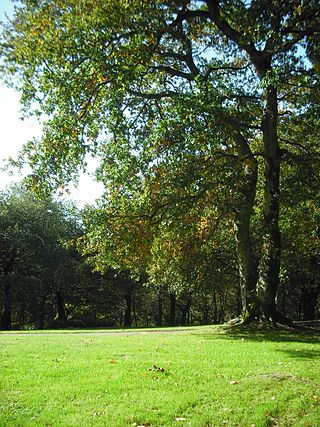
The park of San Domingos de Bonaval is a park in Santiago de Compostela.
Sight 2: Panteón de Galegos Ilustres
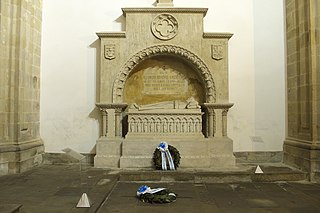
The Pantheon of Illustrious Galicians atópase na igrexa do convento de San Domingos de Bonaval, in Santiago de Compostela. All the church is Pantheon, and they are only being used in the Capela da Visitación and the Capela do Santo Cristo. They do not repouse the remains of Galician leftovers such as the poet Rosalía de Castro, or the rexionalist politician Alfredo Brañas, or the sculptor Francisco Asorey, or the poet Ramón Cabanillas, or the xeographer Domingo Fontán and the artist and nationalist politician Alfonso Daniel Rodríguez Castelao.
Sight 3: Centro Galego de Arte Contemporánea
The Centro Galego de Arte Contemporánea, CGAC is an arts centre based in Santiago de Compostela that aims to promote culture in Galicia through exhibition, enjoyment and knowledge of the trends and currents of contemporary artistic creation.
Wikipedia: Centro Galego de Arte Contemporánea (EN), Website
Sight 4: Igrexa de Santa María do Camiño
The Church of Santa Maria del Camino is an eighteenth-century neoclassical church, originally built in the thirteenth century, if not earlier, situated in the historic center of Santiago de Compostela, Galicia, Spain.
Wikipedia: Igreja de Santa Maria do Caminho (Santiago de Compostela) (PT)
Sight 5: Capela de Ánimas
Capela de Ánimas is a church in Santiago de Compostela, Province of A Coruña, Galicia, Spain. It was completed in 1788.
Sight 6: Casa Gótica
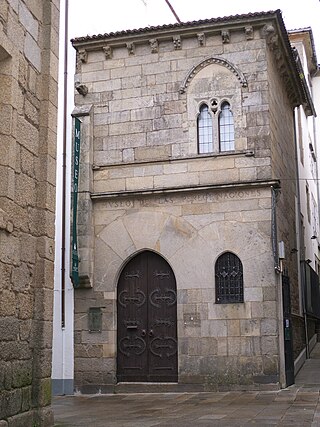
The Gothic House, also called the House of King Dom Pedro, is a fourteenth-century palace located in the historic center of Santiago de Compostela, Galicia, Spain, in front of the Church of San Martinho Pinaririo. It currently houses the Museum of Pilgrimages. It is one of the rare examples of fourteenth-century civil architecture in the city, although only Gothic remains persist on the ground floor, in the form of the ogival door and a decorated window, also ogival
Sight 7: Igrexa de San Bieito do Campo
The Church of São Bento do Campo is an eighteenth-century neoclassical church, originally built in the tenth century, located in the historic center of Santiago de Compostela, Galicia, Spain.
Sight 8: Igrexa de San Fiz de Solovio
The church of San Fiz de Solovio is a religious temple located in the center of the city of Santiago de Compostela. Ten a sona de se-la igrexa más antiga da cidade, aínda que fuei demoliqueda, rebuilt and subjected to different reforms and extensions later or long of oito secules. It is dedicated to San Fiz.
Sight 9: Igrexa da Compañía ou da Universidade
The Igrexa da Compañía de Xesús, more known as Igrexa da Compañía or Igrexa da Universidade, located in the Praza da Universidade, bordering the Praza de Mazarelos or the Institute, was built in the seventeenth century, finishing off its construction in 1767, and belonged to the Colexio da Compañía de Xesús to which, after the expulsion of two xesuites, It became a cappella da Universidade in 1769.
Wikipedia: Igrexa da Compañía de Xesús de Santiago de Compostela (GL)
Sight 10: Igrexa das Orfas
As Orfas refers to a group of baroque buildings in Santiago de Compostela, Province of A Coruña, Galicia, Spain.
Sight 11: Igrexa de Santa María Salomé
The church of Santa María Salomé is a Catholic temple originally built in the twelfth century located in Santiago de Compostela, Galicia. Consider the only church dedicated to Saint Salome, the apostle of St. James.
Wikipedia: Igrexa de Santa María Salomé de Santiago de Compostela (GL)
Sight 12: Pazo de Ramirás e Antigo Colexio dos Irlandeses
The Palace of Ramirás or Palace of the Counts of Ramiranes, also known as the College of the Irish, is a pazo ("house-palace") located on Rua Nova, in the historic center of Santiago de Compostela, Galicia, Spain.
Sight 13: Museo das Peregrinacións e de Santiago
The Museum of Pilgrimages and Santiago is a museum in Santiago de Compostela focused on the universal phenomenon of pilgrimage and not the birth and development of the city of Santiago or around the cathedral and the pilgrimage to the tomb of Santiago or Maior.
Wikipedia: Museo das Peregrinacións e de Santiago (GL), Website
Sight 14: Fonte dos Cabalos
The Fountain of the Pratarías, more coñecida with the Fountain of the Cabals, is a monumental fountain of Baroque style in Compostela, designed by J. Pernas from the year 1825 that is located in the center of the Plaza de las Pratarías, in the city of Santiago de Compostela.
Sight 15: Fachada das Pratarías
The façade of the Pratarías is the southern façade of the cruceiro of the cathedral of Santiago de Compostela.
Sight 16: Capela de Mondragón
The Chapel of Mondragón, also known as the Chapel of the Piedad or Chapel of Santa Cruz, is a chapel of the Cathedral of Santiago de Compostela.
Sight 17: Fachada da Acibecharía
The façade of the Acibecharía is the north façade of the cathedral of Santiago and was built by Lucas Ferro Caaveiro, replacing the previous Romanesque one, called the Paradise, which was built by Mestre Bernardo in 1122. It is the access to the pilgrims' cathedral that follows the French, Primitive and English paths through the Porta Francíxena.
Sight 18: Botafumeiro
Get Ticket*The Botafumeiro is a famous thurible used at the Santiago de Compostela Cathedral, in Spain. Its name comes from the Galician language, where botar means "to eject, to throw away, to expel", and the Latin fume, meaning "smoke".
Sight 19: Fachada do Obradoiro
The façade of the Obradoiro is the main façade, facing west, of the Cathedral of Santiago de Compostela, the result of successive modifications on the original construction from the sixteenth and seventeenth centuries and finished off by Fernando de Casas Novoa between 1738 and 1750.
Sight 20: Museo da Catedral de Santiago
The Museum of the Cathedral of Santiago de Compostela is an institution that collects and exhibits various artistic and archaeological works, owned by Compostela, ranging from Roman times to the present day. It was created with the objective of conserving and exhibiting or public liturgical objects in disuse, doazóns de peregrinos nobres and the different archaeological remains that were being discovered in different interventions in the cathedral and its surroundings. Among the collections are archaeological exhibitions, painting, sculpture, painting, tapestries, carpets, liturgical clothing, ceramics and furniture.
Wikipedia: Museo Catedralicio de Santiago de Compostela (GL)
Sight 21: Santiago de Compostela
Get Ticket*Santiago de Compostela is the only place in the parish of Santiago de Compostela, in the municipality of Santiago de Compostela in A Coruña, in the region of Santiago. Second or IGE, in 2023 it has 82,591 inhabitants. É a capital do concello.
Wikipedia: Santiago de Compostela, Santiago de Compostela, Santiago de Compostela (GL)
Sight 22: Igrexa de San Froitoso
A igrexa das Angustias de Abaixo, igrexa da Real Angustia ou igrexa de San Froitoso, is a temple of Churrigueresque style located in Santiago de Compostela, a rentes da praza do Obradoiro, which was commissioned by Lucas Ferro Caaveiro in the eighteenth century.
Wikipedia: Igrexa de San Froitoso de Santiago de Compostela (GL)
Sight 23: Capela do Pilar
The Church or Chapel of Our Lady of the Pillar (Galician: Igrexa del Pilar; Spanish: Iglesia de Nuestra Señora del Pilar is a Roman Catholic temple built in 1717 in Baroque style in Santiago de Compostela, Galicia, Spain. It is located in Alameda Park, the most emblematic park in the city, next to Paseo de la Ferradura and close to the Church of Santa Susana.
Wikipedia: Igreja de Nossa Senhora do Pilar (Santiago de Compostela) (PT)
Sight 24: Parque da Alameda
Get Ticket*The Alameda de Santiago de Compostela, or the Alameda Park of Santiago de Compostela is the most outstanding urban park in the city of Santiago de Compostela.
Sight 25: Capela de Santa Susana
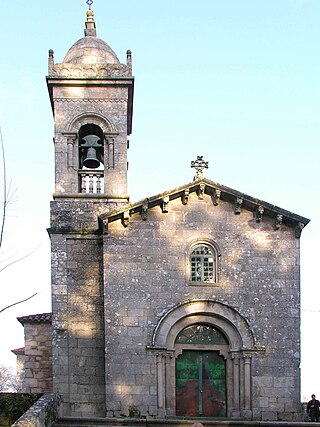
- Publicada por/Publish by: Luis Miguel Bugallo Sánchez
The Church or Chapel of Santa Susana Church is a Catholic temple originally built in the Romanesque style in the twelfth century in Santiago de Compostela, Galicia, Spain. It is located in Parque da Alameda, the most emblematic park in the city, more precisely in the Carballeira (oak grove) of Santa Susana, at the top of Paseo da Ferradura.
Wikipedia: Igreja de Santa Susana (Santiago de Compostela) (PT)
Sight 26: Observatorio Astronómico Ramón María Aller
The Ramón María Aller Astronomical Observatory is a scientific research and teaching centre belonging to the University of Santiago de Compostela, located on the Life Campus of the capital of Galicia, and directed by José Ángel Docobo. The enclosure was built in 1943 with the co-sponsorship of the CSIC, the Galician astronomer Ramón María Aller Ulloa, who worked at the USC and decided to move from his native Lalín to Santiago de Compostela the aparellos of the Lalín Astronomical Observatory, which he himself built 31 years earlier in the locality, to continue with his study of two stars.
Sight 27: Praza do Seminario de Estudos Galegos
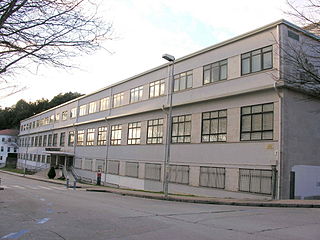
- Publicada por/Publish by: Luis Miguel Bugallo Sánchez.
The Praza do Seminario de Estudos Galegos de Santiago de Compostela is an Axardinada praza located on the South Campus of the University of Santiago.
Share
How likely are you to recommend us?
Disclaimer Please be aware of your surroundings and do not enter private property. We are not liable for any damages that occur during the tours.
GPX-Download For navigation apps and GPS devices you can download the tour as a GPX file.
